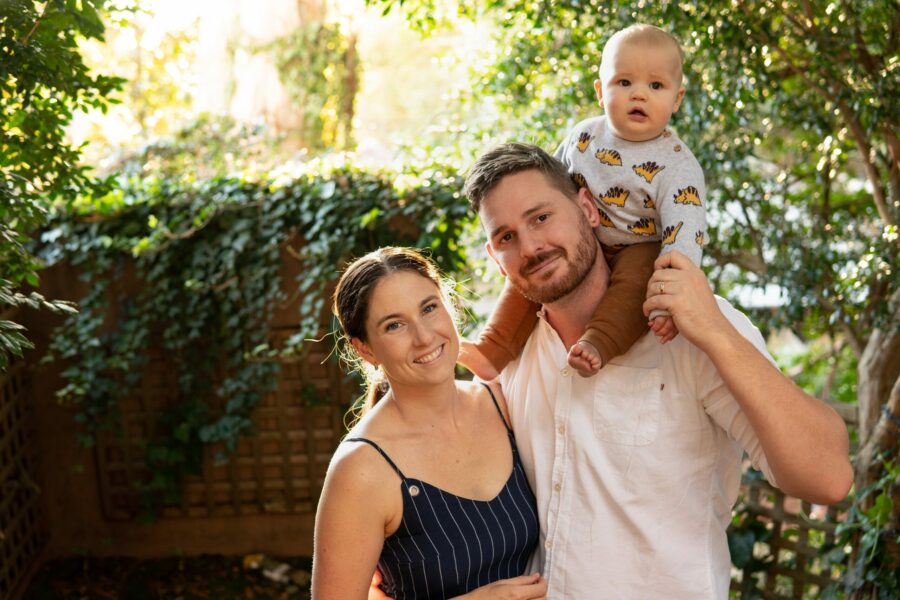Now that you have finished treatment for lymphoma, you may be ready to start a family. Or you may want to know if you need to take extra precautions to prevent a pregnancy.
Lymphoma treatments can have lasting effects on your fertility and you may need help getting pregnant but, for some people a natural pregnancy may still be possible.
This page will provide information on what you need to know about fertility after treatment, and options you have to start a family, or prevent an unwanted pregnancy.

What is fertility
Fertility is your ability to make a baby. We cannot make a baby on our own, it needs both male and female sex organs and hormones to create the eggs and sperm needed to make a baby.
Definitions
We recognise that some people do not identify as male or female or identify with a gender different to their biological sex. For the purposes of discussing fertility on this page, when we mention male, we refer to people born with male sexual organs such as a penis and testes. When we refer to female, we refer to those born with female sexual organs including a vagina, ovaries and womb (uterus).
What are sex hormones?
Androgens
Androgens are hormones that are needed for us to develop. The most common androgen is called testosterone and everyone needs some of this hormone to develop properly and be able to reproduce. However, testosterone levels are higher in males.
Testosterone
Testosterone is made in a gland that sits just above our kidneys. This gland is called our adrenal gland. Some testosterone is also made in the testes, which is why males naturally produce more than females.
Healthy testosterone levels are needed to help us develop male or female sexual characteristics and also for males to produce sperm. The healthy level of testosterone is different for males and females.
Oestrogen and Progesterone
Oestrogen and progesterone are considered female sex hormones as they are needed to develop female sexual characteristics and to help eggs (ova) to develop and mature to a point they can be fertilized by sperm. However, males also have a small amount oestrogen, but less than females have.
What are sexual characteristics?
Sexual characteristics are characteristics that separate males and females regardless of gender. They can include the:
- sound of our voice – males naturally develop a deeper voice than females.
- development of breasts – females naturally develop larger breasts than males.
- male or female organs at birth – males are born with a penis, scrotum and testicles, while females are born with a uterus (womb), ovaries, and vagina.
- production and maturation of sperm (in males) or eggs (in females).
- widening of hips in females to allow a baby to move through during childbirth.
How is fertility affected after treatment?
Depending on the type of treatment you had, your
- body may no longer produce enough of the hormones needed for your sperm or eggs to mature to a point that they are able to make a baby
- sexual organs may have been damaged, removed or scarred so you are not longer able to produce sperm, eggs, or carry a baby in your womb.
Is this effect permanent?
In some cases the effect on your fertility may be permanent, meaning you will never be able to naturally get pregnant or get someone else pregnant. In some cases, your fertility may recover in time, but how long this takes is different for everyone.
Talk to your doctor about how long your fertility may be affected by your treatment.
Can I get (or get someone else) pregnant after treatment
Having treatment for lymphoma can make getting pregnant or getting someone else pregnant more difficult. However, some people may still achieve a pregnancy naturally. If a natural pregnancy is not possible, there are other options available to help you get pregnant.

Natural pregnancy
A natural pregnancy is when an egg is fertilised by sperm after a male and female have vaginal sex. In some cases, a natural pregnancy can still occur after treatment, but this will depend on your treatment, your age, where in your body the lymphoma was and any other underlying conditions.
To achieve a natural pregnancy, males need to be able have an erection, and your sperm needs to mature and be healthy enough to fertilise an egg.
If you are female, you need an egg to mature and be released by your ovaries and to be fertilised by sperm. You also need to have the ability to produce the right amount of hormones to maintain the pregnancy and have a womb that can carry the baby.
How do I know if I can get (or get someone else) pregnant?
Ask your doctor to check your fertility. You can have blood tests to check your hormone levels and also have other tests to check the quality of your sperm or eggs and womb. You may also ask for a referral to see a fertility specialist.
Talk to your doctor if you have any difficulty having sex. Some difficulties that can happen after treatment include:
- a low sex drive (libido)
- difficulty having or maintaining an erection
- vaginal dryness.
In-vitro Fertilisation (IVF)
If you had time to collect and store sperm eggs or other tissue to help with fertility, you may be able to fall pregnant with IVF. Talk to your doctor about how long after treatment you should wait before trying.
Donor sperm or eggs
You may have needed to start treatment quickly or had other reasons that you were unable to collect and store your sperm, eggs or other tissue. IVF treatment may still be an option for you by using sperm or eggs donated by somebody else.
What if pregnancy is not an option?
There are many ways to start a family, and if getting pregnant is not possible there are still options available. Click on the heading below to learn about different options.
Surrogacy is when somebody else has a baby for you. In some cases they can use your, and your partners eggs and sperm, or they may use their own, or a donors eggs or sperm. The surrogate carries the baby in their body during pregnancy but is not legally considered the baby’s parent.
There are different laws around surrogacy across Australia. If you are interested in finding out more, talk to your doctor or ask to be referred to a fertility doctor.
Adoptions is when a child is born to biological parents that for any reason cannot, or choose not to raise the child as their own. The child is then adopted by another couple or single person to raise as their own child. The adopted parent/s become the legal parents.
Children of any age, including babies can be adopted.
Adoptions can happen within Australia where a child born in Australia is adopted to parent/s in Australia. But international adoptions are also possible where you can adopt a baby or child born in another country.
To learn more about adoption in your state click on the links below.

Foster care may be an option for you. Foster care can include short- and long-term care of children who need a safe and loving home.
In some cases, foster care can lead to adoption if suitable.
Facing fertility challenges after treatment can be very challenging, both emotionally and physically. It is important to make sure you have support around you. Specialist Fertility counselling support is available through most fertility clinics and can include Psychologists, Psychotherapist and Social workers.
What if I don’t want to get (or get someone else) pregnant.
Talk to you doctor about your fertility if you do not want a pregnancy. There are many different choices of contraceptives, so ask your doctor to explain the different choices you have for your circumstances.
Who may be involved in your fertility care
There are different types of specialist doctors that may be able to help you with your fertility. Click on the links below to learn about.
A gynaecologist is a doctor with extra training and a special interest in treating conditions of the female reproductive system and breasts. They can check your fertility and give you advice on the best way to get pregnant, or avoid pregnancy if you do not want to get pregnant.
They can also help if you have any difficulties or pain during sex.
An andrologist is a doctor with extra training and a special interest in treating conditions of the male reproductive system. They can check your fertility and treat conditions that may cause hormone imbalances or affect your ability to have and sustain an erection.
An endocrinologist is a doctor with extra training and a special interest in treating conditions of the endocrine (or hormone) system. They can help if you have hormone imbalances after treatment.
A fertility doctor may be involved in your care if you need help getting pregnant through IVF using your own, or a donors sperm and eggs. They can also help if you have hormone imbalances affecting your fertility and do genetic testing.
Most fertility doctors are also gynecologists or obstetricians.
An obstetrician is a doctor with extra training and a special interest in caring you and your baby during and just after pregnancy.
Summary
- Lymphoma treatments can have temporary or permanent affects on your fertility.
- Treatment can affect you fertility causing hormonal changes or damage to your reproductive organs.
- Natural pregnancy can still happen for some people who have had treatements.
- If you do not want to get pregnant – or get somebody else pregnant, talk to your doctor about having fertility tests done, and how to best prevent an unwanted pregnancy.
- You may need extra help to get pregnant through IVF using your own and your partners sperm and eggs, or a donors.
- Other options to start a family include surrogacy, adoption and fostering.
- Talk to your doctor about your options and referrals to the above specialist.
- You are not alone, our Lymphoma Care Nurses are here to help. Call our nurses Mon-Fri 9am-4:30pm Eastern Standard Time. Click the contact us button at the bottom of the screen for details.

